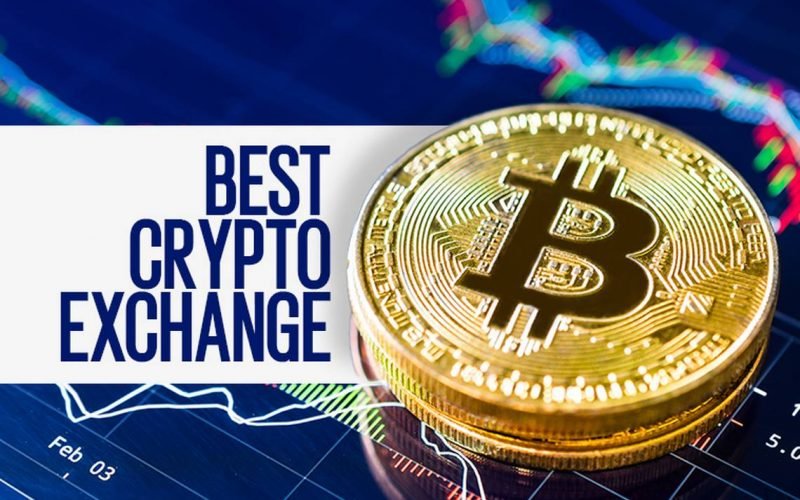Simply having a list of crypto exchanges isn’t enough when it comes to making the right choice. The ideal platform can dramatically influence your trading experience. The best ones offer a winning combination of robust security, competitive fees, and a diverse selection of supported cryptocurrencies. This guide dives into the top crypto trading platforms that excel in these key areas, empowering you to make an informed decision.
This revision emphasizes the importance of choosing the right exchange for your specific trading needs. It also clarifies that the focus is on platforms that excel in security, fees, and coin variety.
The rest of the text seems clear and informative. It highlights the core function of a crypto exchange and then lists some popular options.
Choosing the Best Crypto Exchange for Your Trading Needs

A Comparative Analysis: Top Cryptocurrency Exchanges
After an extensive evaluation of over 30 prominent crypto exchanges, we’ve carefully considered factors such as fees, features, trading volume, and the breadth of supported cryptocurrencies. Based on our comprehensive analysis, we present our top 10 cryptocurrency exchanges:
- Binance: Best for beginners
- MEXC: Best for zero-fee trading
- Bybit: Best for advanced derivatives traders
- BingX: Best Bitcoin exchange for grid traders
- Crypto.com: Best exchange for mobile app users
- Coinbase: Best for institutional crypto investors
- Kraken: Best for security
- Uniswap: Best decentralized crypto exchange
- Bitget: Best for copy trading
- Kucoin: Best for altcoin trading
Here is a detailed review of the best crypto exchanges based on their features, fees, availability, and pros & cons.
Binance – Best for beginners
Binance, established in 2017, has rocketed to the top of the crypto exchange world. Boasting daily trading volumes exceeding $20 billion and a user base surpassing 216 million, it’s a clear favorite for a global audience.
Catering to All Levels: Binance offers a user-friendly interface that caters to both novice and experienced traders. Newcomers can benefit from Binance Academy’s free educational resources, helping them navigate the complexities of the crypto space.
Diverse Services Fuel Popularity: The platform’s popularity stems from its extensive service offerings. This includes spot trading, futures, options trading, and even a peer-to-peer marketplace.
Security and Speed: Binance prioritizes security, featuring a Secure Asset Fund for Users (SAFU) that allocates 10% of trading fees to safeguard user funds in emergencies. Additionally, the platform can handle a staggering 1.4 million transactions per second, ensuring swift trade execution.
Earning Potential: Beyond trading, Binance Earn allows users to generate passive income by staking their crypto assets. Some holdings can yield up to a remarkable 20% annual return.
Fees and Accessibility: Binance utilizes a tiered fee structure, with spot trading fees starting at a competitive 0.1% maker/taker rate. By holding Binance Coin (BNB) and trading high volumes, users can further reduce fees. Withdrawal fees vary based on the chosen cryptocurrency and network conditions.
It’s important to note that Binance’s global reach extends to over 180 countries, but some regions may have restricted access due to local regulations. U.S. residents should utilize Binance.US, a separate platform with a reduced feature set. Thankfully, Binance offers diverse fiat deposit methods, including bank transfers, credit/debit cards, and third-party payment options.
MEXC – Best for zero-fee trading
MEXC, founded in 2018, has rapidly emerged as a prominent player in the digital currency trading landscape. Serving over 10 million customers across 170+ countries, it offers a diverse range of trading options, including spot trading, perpetual futures, copy trading, and staking rewards.
A Vast Ecosystem: MEXC boasts a vast ecosystem of over 2,500 tradable crypto assets and 3,000+ trading pairs, making it a haven for altcoin enthusiasts. Renowned for its swift addition of new tokens, MEXC frequently pioneers trading opportunities for emerging digital currencies.
Prioritizing Security: Security is a top priority at MEXC. The exchange employs advanced wallet technology and rigorous safety protocols to safeguard user funds.
User-Friendly Experience: MEXC’s user-friendly interface caters to both beginners and seasoned traders. Holders of MX, the exchange’s native token, enjoy the benefits of lower trading fees and exclusive access to new token sales. For mobile traders, MEXC offers dedicated Android and iPhone apps.
Fees and Accessibility: MEXC stands out with its zero-fee spot market. Futures trading also benefits from low fees, starting at 0% for makers and 0.01% for takers. Using MX tokens can further reduce these fees by half.
While MEXC operates in over 170 countries, it’s important to note that it’s currently unavailable in the United States, Canada, and a few other regions. However, MEXC’s no-KYC policy allows users from restricted areas to access the platform, although this practice is against its terms and conditions.
Bybit – Best for advanced derivatives traders
Bybit, founded by Ben Zhou, has rapidly established itself as a premier platform for crypto derivatives trading. Serving over 40 million users, Bybit specializes in perpetual contracts, futures, and options on major cryptocurrencies like Bitcoin, Ethereum, and XRP. Renowned for its impressive liquidity, Bybit often boasts daily trading volumes exceeding $10 billion.
Cutting-Edge Technology: Bybit’s powerful trading engine can process up to 100,000 transactions per second, ensuring minimal latency and seamless order execution even during volatile market conditions. The platform also offers up to 100x leverage on select trading pairs.
Security and Education: Bybit prioritizes security, employing multi-signature cold wallets and conducting regular security audits to protect user funds. To support new traders, Bybit provides comprehensive educational resources, including trading guides, market analysis, and a demo account for risk-free practice.
Expanding Services: Beyond derivatives, Bybit has expanded its offerings to include crypto lending, trading bots, and a launchpool for new token projects. The platform’s mobile app, available on iOS and Android, enables users to trade on the go and receive real-time market updates. Additionally, Bybit’s Web3 portal features a non-custodial DeFi wallet, NFT marketplace, and DApp explorer.
Fees and Accessibility: Bybit utilizes a maker-taker fee model, with spot trading fees starting at 0.1% for takers and makers. Futures trading fees are even more competitive, beginning at 0.055% for takers and 0.02% for makers. Higher trading volumes and VIP membership can further reduce these fees. USDC options trading incurs a 0.2% maker/taker fee.
While Bybit enjoys global reach in over 180 countries, it’s currently unavailable in the United States and Canada due to regulatory restrictions.
BingX – Best Bitcoin exchange for grid traders
BingX, founded in 2018, has emerged as a prominent platform for copy and derivative trading. Serving over 10 million users across 100+ countries, it offers a comprehensive suite of services including copy trading, futures, and spot trading.
Advanced Features and User-Friendly Interface: BingX stands out with its advanced trading tools and intuitive user interface. Its social trading feature allows users to observe and replicate the strategies of successful traders. Additionally, the platform supports automated grid trading bots for efficient trading.
Diverse Trading Options: BingX offers a wide range of trading options, including perpetual futures contracts with up to 125x leverage, and spot trading for over 800 cryptocurrencies.
Security and Reliability: BingX prioritizes security, implementing multi-signature cold wallets, Proof of Reserves (PoR) data, 2FA, and conducting regular security assessments.
Fees and Accessibility: BingX utilizes a tiered fee structure based on trading volume. Spot trading fees typically start at 0.1% for both makers and takers. Futures contracts incur a fee of 0.02% for makers and 0.05% for takers.
While BingX operates in over 100 countries, it’s currently unavailable in the United States, Canada, and the United Kingdom.
Crypto.com – Best exchange for mobile app users
Crypto.com excels as a mobile-first crypto exchange, offering user-friendly apps for both Android and iOS devices.
These apps mirror the functionality of the desktop version, providing access to crypto trading, market alerts, and more. The platform supports trading for over 350 cryptocurrencies and allows purchases using over 20 fiat currencies.
Beyond Trading: Crypto.com distinguishes itself with its innovative Visa card program. This program empowers users to spend their cryptocurrency at over 80 million merchants globally, seamlessly bridging the gap between crypto and everyday purchases. Additionally, the platform offers lucrative staking rewards for certain cryptocurrencies, with some tokens yielding an impressive annual percentage yield (APY) of up to 14%.
Global Presence and Security: Crypto.com consistently ranks among the top 20 cryptocurrency exchanges by trading volume, often exceeding $1 billion daily. The platform prioritizes security and regulatory compliance, having secured licenses in multiple jurisdictions, including Europe, the UK, and parts of the United States.
Fees and Accessibility: Crypto.com utilizes a maker-taker fee model, with base fees of 0.3% for takers and 0.15% for makers. Staking the platform’s native CRO token can significantly reduce fees, with potential discounts reaching up to 30%. While fiat deposits via bank transfer are generally free, credit card purchases incur a 2.99% fee.
Crypto.com operates in over 100 countries worldwide, although specific services may be limited in certain regions due to regulations. Notably, it offers services in 49 US states but excludes users from China, Pakistan, and Russia.
Coinbase – Best for institutional crypto investors
Coinbase, a prominent U.S.-based crypto exchange, has garnered a substantial user base of over 110 million crypto investors. The platform supports a diverse range of over 240 cryptocurrencies, including prominent assets like BTC, ETH, SOL, and LTC. While Coinbase generally focuses on popular and high-cap altcoins, it offers two distinct platforms to cater to different user needs: Coinbase and Coinbase Advanced. The former provides a user-friendly interface, while the latter is tailored for advanced traders with features like real-time charts, limit orders, and futures trading.
Beyond retail investors, Coinbase also serves institutional clients through Coinbase Prime and Coinbase Custody. These services offer advanced trading tools, dedicated account management, and comprehensive reporting. For institutional investors seeking large-scale trades without significant price fluctuations, Coinbase’s Over-The-Counter (OTC) desk is a valuable asset.
Security and Regulation: Coinbase prioritizes security, utilizing cold storage to store 98% of assets offline, minimizing the risk of hacking. The exchange is fully regulated in the United States, adhering to stringent financial regulations.
Fees and Accessibility: Coinbase’s fee structure is generally higher than average. It charges a spread of around 0.50% per transaction, along with a flat fee based on the trading amount. Coinbase Advanced, the professional trading platform, employs a maker-taker model with fees of 0.4% for makers and 0.6% for takers.
Coinbase operates in over 100 countries, with U.S. users enjoying access to more features, including ACH transfers and PayPal withdrawal options. However, it’s important to note that Coinbase is not available for users residing in Hawaii.
Kraken: Best for security
Established in 2011, Kraken is one of the most seasoned cryptocurrency exchanges. Serving over 10 million users across 190+ countries, Kraken offers a vast selection of over 200 digital currencies, ranging from popular options like Bitcoin and Ethereum to lesser-known coins.
Security at the Forefront: Kraken’s standout feature is its unwavering commitment to security. The exchange maintains 95% of user funds in offline, cold storage systems distributed globally. A dedicated team of security experts continuously monitors and strengthens the platform’s defenses. Impressively, Kraken has maintained an impeccable security record, avoiding any significant breaches throughout its history.
Catering to Diverse Needs: Kraken provides various account types to accommodate different user needs. New traders can start with basic accounts, while experienced users can access advanced features like margin trading and futures through pro-level accounts. The platform’s design strikes a balance between user-friendliness and advanced functionality, further enhanced by mobile apps for both major smartphone platforms.
Institutional Services and Passive Income: For large-scale transactions, Kraken offers an Over-The-Counter (OTC) trading desk. Additionally, users can earn passive income through Kraken’s staking service for select cryptocurrencies.
Fees and Accessibility: Kraken employs a tiered fee system based on 30-day trading volumes. Fees start at 0.25% for makers and 0.4% for takers in the lowest tier, with potential reductions to 0% for makers and 0.10% for takers at higher volumes. Deposit costs vary by method, with some options incurring no fees.
While Kraken operates in over 190 countries, certain regions may have restricted services due to local regulations. Most U.S. states can access Kraken, but there are exceptions such as New York and Washington.
Uniswap: Best decentralized crypto exchange
Uniswap, a leading decentralized cryptocurrency exchange (DEX) on the Ethereum network, was founded in November 2018 by developer Hayden Adams. This platform revolutionizes token trading by eliminating the need for centralized intermediaries. Users can directly trade ERC-20 tokens from their personal crypto wallets. As of 2024, Uniswap’s impressive trading volume of over $1 trillion solidified its position as a top DEX globally.
Automated Market Making (AMM): Uniswap operates on an AMM system, dispensing with traditional order books. Instead, it utilizes liquidity pools where users can deposit token pairs and earn a share of trading fees. This approach ensures continuous trading and maintains liquidity for even lesser-known tokens. Uniswap currently supports thousands of tokens, and its latest version, Uniswap V3, introduces concentrated liquidity for enhanced efficiency.
Non-Custodial Security and Governance: Uniswap’s non-custodial nature empowers users to retain full ownership of their digital assets throughout the trading process. The platform’s smart contracts undergo regular audits to maintain robust security standards. Furthermore, Uniswap’s open-source design fosters community-driven development and allows developers to build upon its foundation. In 2020, the platform introduced its governance token, UNI, granting holders voting rights on future upgrades and fund allocation.
Fees and Accessibility: Uniswap’s fee structure is straightforward but can fluctuate based on network congestion. The platform charges a 0.3% fee for each trade, which is distributed to liquidity providers. However, users must also pay Ethereum network fees (gas fees), which can vary significantly depending on network activity. During periods of high congestion, gas fees can surge, making small trades more costly.
Uniswap’s decentralized nature ensures global accessibility, as there are no geographical restrictions.
Bitget: Best for copy trading
Founded in 2018, Bitget has emerged as a prominent crypto copy trading exchange. With a user base exceeding 30 million, it provides a comprehensive trading experience for both spot and derivatives markets. The platform supports over 800 trading pairs and boasts a user-friendly interface with advanced charting tools and various order types to enhance the trading experience.
Copy Trading Excellence: Bitget’s standout feature is its “One-Click Copy Trade” system, enabling users to automatically replicate the strategies of successful traders. This feature has attracted over 150,000 elite copy traders to the platform.
Security and Accessibility: Bitget prioritizes security, utilizing multi-signature cold wallets and conducting regular security audits. The exchange also offers a mobile app for iOS and Android devices, allowing traders to manage their portfolios on the go.
Bitget is committed to regulatory compliance, having obtained licenses in Poland and Lithuania. Its 24/7 customer support, available in multiple languages, further enhances its global reach.
Fees and Availability: Bitget employs a maker-taker fee model, with spot trading fees starting at 0.1% for both makers and takers. These fees can be reduced based on trading volume and BGB holdings. Futures trading fees are even more competitive, starting at 0.02% for makers and 0.06% for takers.
While Bitget operates in over 100 countries, it’s currently unavailable in the United States, Singapore, and Canada.
Kucoin: Best for altcoin trading
Launched in 2017, KuCoin has quickly gained popularity among crypto traders seeking a diverse range of altcoins with substantial liquidity and volume. The platform now caters to over 30 million customers. KuCoin’s standout feature is its extensive selection of over 700 cryptocurrencies and 1,200+ trading pairs, making it a dream destination for altcoin enthusiasts.
Comprehensive Trading Features: The platform offers a user-friendly interface coupled with advanced trading options, including spot and margin trading, futures contracts, and a P2P marketplace. KuCoin’s unique “Spotlight” program introduces promising blockchain projects, providing traders with early access to potentially valuable tokens. Additionally, the platform’s native cryptocurrency, KCS, offers benefits like lower fees and daily bonuses through its Profit-Sharing scheme.
Security and Additional Services: KuCoin prioritizes security by storing most assets in offline wallets and conducting regular vulnerability assessments. The exchange also provides supplementary services such as crypto loans, staking options, and an NFT marketplace.
Fees and Accessibility: KuCoin employs a maker-taker pricing structure, with basic trading fees set at 0.1% for both makers and takers. These fees can be reduced by 20% by holding KCS tokens or trading in large volumes. The platform is accessible worldwide in over 200 jurisdictions, with a few exceptions such as the USA, Canada, and China.
In conclusion, the cryptocurrency exchange landscape is highly competitive, with platforms like Coinbase, Crypto.com, Kraken, Uniswap, and Bitget offering unique features to cater to diverse trader needs. While each exchange provides distinct advantages such as security, variety of assets, and advanced trading tools, they also have their own limitations. Ultimately, the best choice for an individual depends on their specific trading goals, risk tolerance, and technical expertise.




